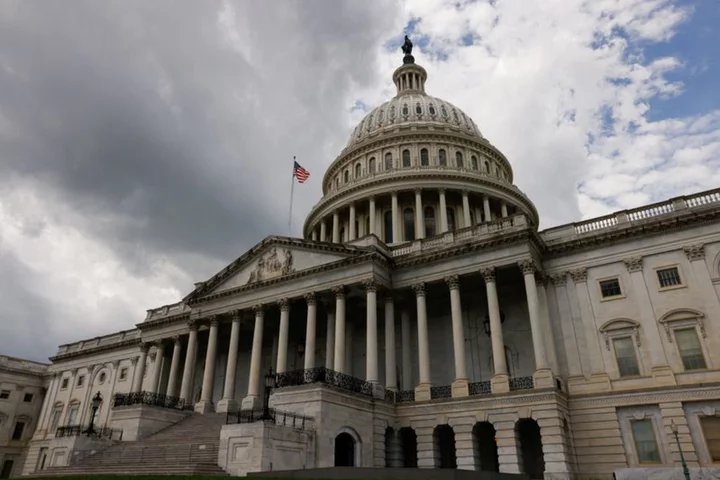By Richard Cowan
WASHINGTON Top Democrats in the U.S. Senate will look to gain the upper hand over House Republicans in talks over government funding when the chamber returns from summer recess on Tuesday, as the threat of an embarrassing October government shutdown looms.
A bipartisan group of senators in the Democratic-controlled chamber was collaborating on President Joe Biden's request for a stopgap spending bill to keep federal agencies funded until deals can be brokered on the full fiscal year beginning Oct. 1.
Democrats and Republicans in the Senate Appropriations Committee have backed the 12 separate spending bills that would finance most government operations for fiscal 2024, while their House Appropriations Committee has been producing bills with only Republican support.
The Senate so far is sticking with the $1.59 trillion discretionary spending budget Biden and top House Republican Kevin McCarthy agreed to this spring, while some hardline House conservatives push for cuts below what their leader agreed to.
"To avoid a harmful and unnecessary government shutdown, the House should follow the Senate’s incredible lead and pass their appropriations bills in a bipartisan way," Democratic Senate Majority Leader Chuck Schumer boasted in a letter to his fellow Democrats on Friday.
The White House last week called on Congress to pass a short-term "continuing resolution" to keep the government funded past Sept. 30, avoiding the fourth shutdown in a decade.
Some hardline House Republicans have dismissed the risks of a government shutdown, saying it could be a cudgel for achieving deeper spending cuts to address the $31.4 trillion national debt. Few other lawmakers in the House or Senate have expressed such an appetite.
Republicans in the House, which returns from its summer break next week, have internal differences over matters ranging from more emergency aid to Ukraine to the size of government-wide spending.
The hardline House Freedom Caucus has insisted on paring discretionary spending for 2024 to the 2022 level of $1.47 trillion, $120 billion below the level McCarthy and Biden agreed to.
Less contentious is Biden's request for approving emergency funds this month to help communities hard-hit by storms, fires and other natural disasters.
Unlike spending fights from the last several years, the Senate appears eager to promptly get the stop-gap bill passed and then present its united front to splintered House Republicans in negotiations, which could extend into December, on the longer-term bills.
"I'm headed toward the conclusion the Senate has an upper hand in final negotiations," said William Hoagland, senior vice president at the non-profit Bipartisan Policy Center.
'A PRETTY BIG MESS'
Top Senate Republican Mitch McConnell has voted for every one of the 12 fiscal 2024 bills advanced by the Senate Appropriations Committee, as have nearly all of his fellow committee Republicans.
McConnell last week bemoaned the funding fight, saying, "Honestly, it's a pretty big mess." Speaking to a business group in his home state of Kentucky, McConnell flat-out warned that the lower, $1.47 trillion in spending for 2024 is "not going to be replicated in the Senate."
That came before the 81-year-old lawmaker froze up while making remarks in public for the second time in little over a month, raising questions about how long he can continue in his leadership role. Congress's doctor on Thursday said McConnell, who suffered a concussion after a fall earlier this year, was cleared to continue work.
Meanwhile, as some hardline House Republicans push for defense spending cuts instead of a buildup, there is pushback within their 222-member caucus.
Republican Representative Tom Cole, who chairs a powerful committee that is the gatekeeper for all legislation, told a group of fellow Republicans in late July: "My guess is, knowing some of our defense guys really well, they ain't going to fight that hard to hold down defense spending. They're like 'please put me in conference so I can surrender immediately.'"
He was referring to a special House-Senate negotiating team that likely would be tasked with ironing out differences between House and Senate defense appropriations bills.
McCarthy will have to walk a tightrope, balancing the need to carry out the most basic congressional function of funding government services while keeping the support of his hard-line right flank, which could call for his removal at any time.
He has so far avoided that trap, including when he held his fractious caucus together through the months-long fight over the nation's debt ceiling, telling reporters after a key June vote, "Keep underestimating us and we'll keep proving to the American public that we'll never give up."
(Reporting by Richard Cowan; Editing by Scott Malone, William Maclean)









